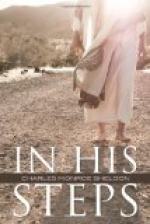“I’m glad you came.” Dr. Bruce laid a hand on the Bishop’s shoulder. “You understand what this means, Edward?”
“I think I do. Yes, I am sure.” The Bishop spoke very slowly and thoughtfully. He sat with his hands clasped together. Over his face, marked with lines of consecration and service and the love of men, a shadow crept, a shadow not caused by the firelight. Once more he lifted his eyes toward his old friend.
“Calvin, we have always understood each other. Ever since our paths led us in different ways in church life we have walked together in Christian fellowship—.”
“It is true,” replied Dr. Bruce with an emotion he made no attempt to conceal or subdue. “Thank God for it. I prize your fellowship more than any other man’s. I have always known what it meant, though it has always been more than I deserve.”
The Bishop looked affectionately at his friend. But the shadow still rested on his face. After a pause he spoke again: “The new discipleship means a crisis for you in your work. If you keep this pledge to do all things as Jesus would do—as I know you will—it requires no prophet to predict some remarkable changes in your parish.” The Bishop looked wistfully at his friend and then continued: “In fact, I do not see how a perfect upheaval of Christianity, as we now know it, can be prevented if the ministers and churches generally take the Raymond pledge and live it out.” He paused as if he were waiting for his friend to say something, to ask some question. But Bruce did not know of the fire that was burning in the Bishop’s heart over the very question that Maxwell and himself had fought out.
“Now, in my church, for instance,” continued the Bishop, “it would be rather a difficult matter, I fear, to find very many people who would take a pledge like that and live up to it. Martyrdom is a lost art with us. Our Christianity loves its ease and comfort too well to take up anything so rough and heavy as a cross. And yet what does following Jesus mean? What is it to walk in His steps?”
The Bishop was soliloquizing now and it is doubtful if he thought, for the moment, of his friend’s presence. For the first time there flashed into Dr. Bruce’s mind a suspicion of the truth. What if the Bishop would throw the weight of his great influence on the side of the Raymond movement? He had the following of the most aristocratic, wealthy, fashionable people, not only in Chicago, but in several large cities. What if the Bishop should join this new discipleship!
The thought was about to be followed by the word. Dr. Bruce had reached out his hand and with the familiarity of lifelong friendship had placed it on the Bishop’s shoulder and was about to ask a very important question, when they were both startled by the violent ringing of the bell. Mrs. Bruce had gone to the door and was talking with some one in the hall. There was a loud exclamation and then, as the Bishop rose and Bruce was stepping toward the curtain that hung before the entrance to the parlor, Mrs. Bruce pushed it aside. Her face was white and she was trembling.




